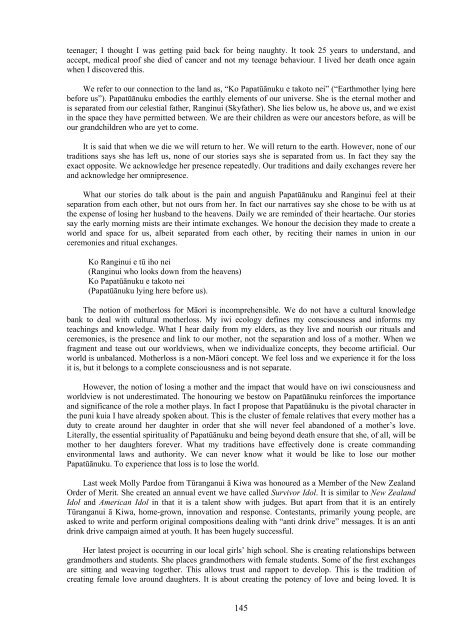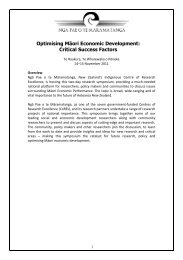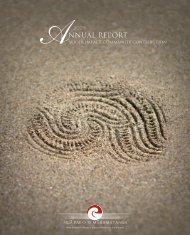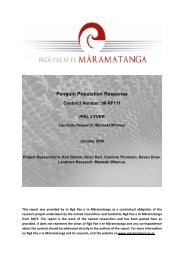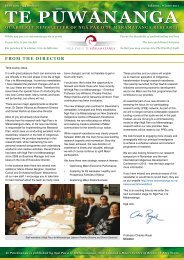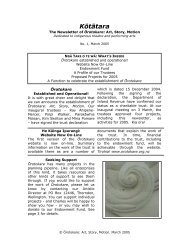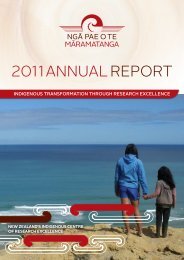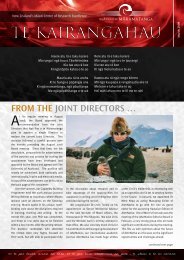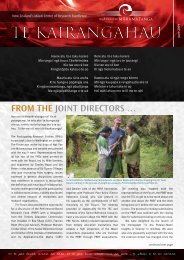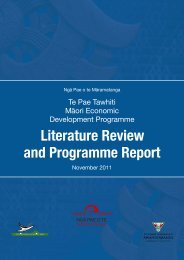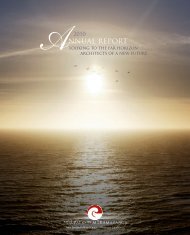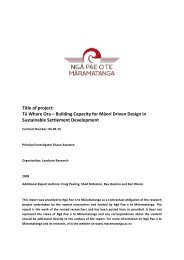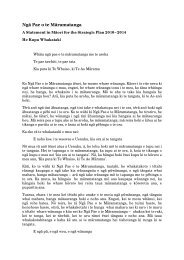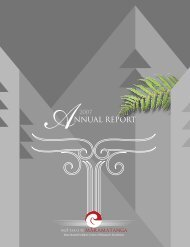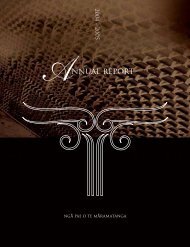traditional knowledge conference 2008 te tatau pounamu
traditional knowledge conference 2008 te tatau pounamu
traditional knowledge conference 2008 te tatau pounamu
Create successful ePaper yourself
Turn your PDF publications into a flip-book with our unique Google optimized e-Paper software.
<strong>te</strong>enager; I thought I was getting paid back for being naughty. It took 25 years to understand, andaccept, medical proof she died of cancer and not my <strong>te</strong>enage behaviour. I lived her death once againwhen I discovered this.We refer to our connection to the land as, “Ko Papatūānuku e takoto nei” (“Earthmother lying herebefore us”). Papatūānuku embodies the earthly elements of our universe. She is the e<strong>te</strong>rnal mother andis separa<strong>te</strong>d from our celestial father, Ranginui (Skyfather). She lies below us, he above us, and we existin the space they have permit<strong>te</strong>d between. We are their children as were our ancestors before, as will beour grandchildren who are yet to come.It is said that when we die we will return to her. We will return to the earth. However, none of ourtraditions says she has left us, none of our stories says she is separa<strong>te</strong>d from us. In fact they say theexact opposi<strong>te</strong>. We ac<strong>knowledge</strong> her presence repea<strong>te</strong>dly. Our traditions and daily exchanges revere herand ac<strong>knowledge</strong> her omnipresence.What our stories do talk about is the pain and anguish Papatūānuku and Ranginui feel at theirseparation from each other, but not ours from her. In fact our narratives say she chose to be with us atthe expense of losing her husband to the heavens. Daily we are reminded of their heartache. Our storiessay the early morning mists are their intima<strong>te</strong> exchanges. We honour the decision they made to crea<strong>te</strong> aworld and space for us, albeit separa<strong>te</strong>d from each other, by reciting their names in union in ourceremonies and ritual exchanges.Ko Ranginui e tū iho nei(Ranginui who looks down from the heavens)Ko Papatūānuku e takoto nei(Papatūānuku lying here before us).The notion of motherloss for Māori is incomprehensible. We do not have a cultural <strong>knowledge</strong>bank to deal with cultural motherloss. My iwi ecology defines my consciousness and informs my<strong>te</strong>achings and <strong>knowledge</strong>. What I hear daily from my elders, as they live and nourish our rituals andceremonies, is the presence and link to our mother, not the separation and loss of a mother. When wefragment and <strong>te</strong>ase out our worldviews, when we individualize concepts, they become artificial. Ourworld is unbalanced. Motherloss is a non-Māori concept. We feel loss and we experience it for the lossit is, but it belongs to a comple<strong>te</strong> consciousness and is not separa<strong>te</strong>.However, the notion of losing a mother and the impact that would have on iwi consciousness andworldview is not underestima<strong>te</strong>d. The honouring we bestow on Papatūānuku reinforces the importanceand significance of the role a mother plays. In fact I propose that Papatūānuku is the pivotal charac<strong>te</strong>r inthe puni kuia I have already spoken about. This is the clus<strong>te</strong>r of female relatives that every mother has aduty to crea<strong>te</strong> around her daugh<strong>te</strong>r in order that she will never feel abandoned of a mother’s love.Li<strong>te</strong>rally, the essential spirituality of Papatūānuku and being beyond death ensure that she, of all, will bemother to her daugh<strong>te</strong>rs forever. What my traditions have effectively done is crea<strong>te</strong> commandingenvironmental laws and authority. We can never know what it would be like to lose our motherPapatūānuku. To experience that loss is to lose the world.Last week Molly Pardoe from Tūranganui ā Kiwa was honoured as a Member of the New ZealandOrder of Merit. She crea<strong>te</strong>d an annual event we have called Survivor Idol. It is similar to New ZealandIdol and American Idol in that it is a talent show with judges. But apart from that it is an entirelyTūranganui ā Kiwa, home-grown, innovation and response. Con<strong>te</strong>stants, primarily young people, areasked to wri<strong>te</strong> and perform original compositions dealing with “anti drink drive” messages. It is an antidrink drive campaign aimed at youth. It has been hugely successful.Her la<strong>te</strong>st project is occurring in our local girls’ high school. She is creating relationships betweengrandmothers and students. She places grandmothers with female students. Some of the first exchangesare sitting and weaving together. This allows trust and rapport to develop. This is the tradition ofcreating female love around daugh<strong>te</strong>rs. It is about creating the po<strong>te</strong>ncy of love and being loved. It is145


